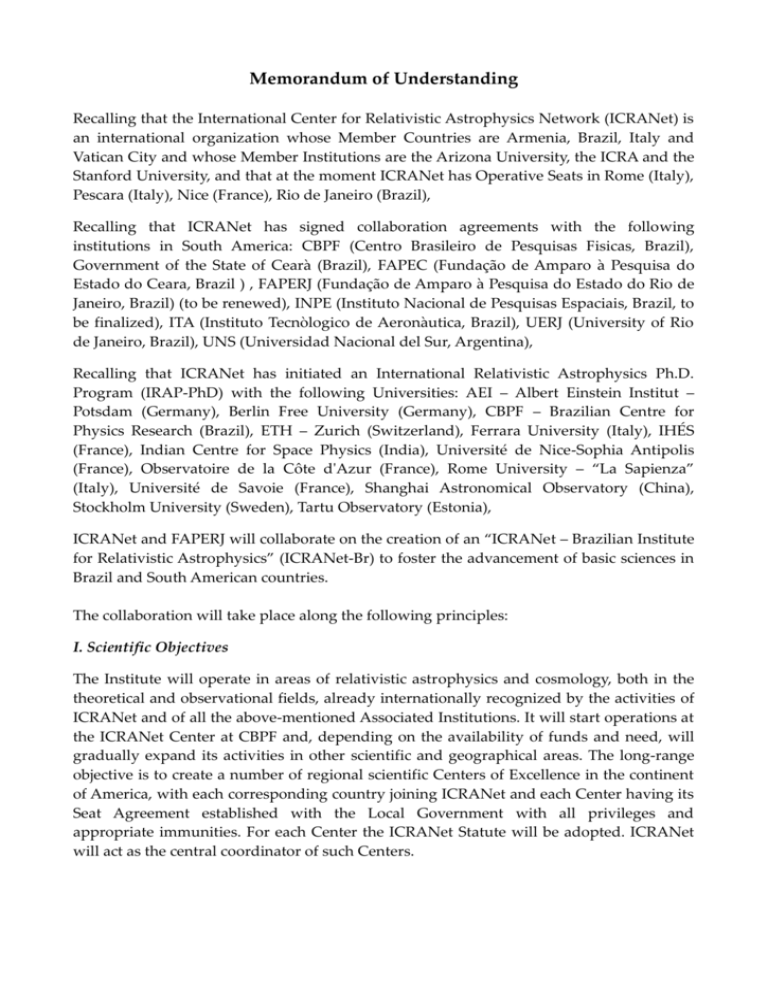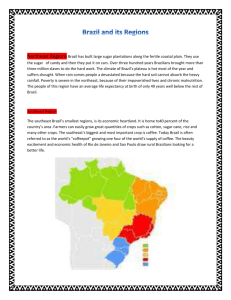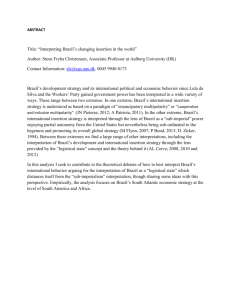Memorandum of Understanding Recalling that the International
advertisement

Memorandum of Understanding Recalling that the International Center for Relativistic Astrophysics Network (ICRANet) is an international organization whose Member Countries are Armenia, Brazil, Italy and Vatican City and whose Member Institutions are the Arizona University, the ICRA and the Stanford University, and that at the moment ICRANet has Operative Seats in Rome (Italy), Pescara (Italy), Nice (France), Rio de Janeiro (Brazil), Recalling that ICRANet has signed collaboration agreements with the following institutions in South America: CBPF (Centro Brasileiro de Pesquisas Fisicas, Brazil), Government of the State of Cearà (Brazil), FAPEC (Fundação de Amparo à Pesquisa do Estado do Ceara, Brazil ) , FAPERJ (Fundação de Amparo à Pesquisa do Estado do Rio de Janeiro, Brazil) (to be renewed), INPE (Instituto Nacional de Pesquisas Espaciais, Brazil, to be finalized), ITA (Instituto Tecnòlogico de Aeronàutica, Brazil), UERJ (University of Rio de Janeiro, Brazil), UNS (Universidad Nacional del Sur, Argentina), Recalling that ICRANet has initiated an International Relativistic Astrophysics Ph.D. Program (IRAP-PhD) with the following Universities: AEI – Albert Einstein Institut – Potsdam (Germany), Berlin Free University (Germany), CBPF – Brazilian Centre for Physics Research (Brazil), ETH – Zurich (Switzerland), Ferrara University (Italy), IHÉS (France), Indian Centre for Space Physics (India), Université de Nice-Sophia Antipolis (France), Observatoire de la Côte d'Azur (France), Rome University – “La Sapienza” (Italy), Université de Savoie (France), Shanghai Astronomical Observatory (China), Stockholm University (Sweden), Tartu Observatory (Estonia), ICRANet and FAPERJ will collaborate on the creation of an “ICRANet – Brazilian Institute for Relativistic Astrophysics” (ICRANet-Br) to foster the advancement of basic sciences in Brazil and South American countries. The collaboration will take place along the following principles: I. Scientific Objectives The Institute will operate in areas of relativistic astrophysics and cosmology, both in the theoretical and observational fields, already internationally recognized by the activities of ICRANet and of all the above-mentioned Associated Institutions. It will start operations at the ICRANet Center at CBPF and, depending on the availability of funds and need, will gradually expand its activities in other scientific and geographical areas. The long-range objective is to create a number of regional scientific Centers of Excellence in the continent of America, with each corresponding country joining ICRANet and each Center having its Seat Agreement established with the Local Government with all privileges and appropriate immunities. For each Center the ICRANet Statute will be adopted. ICRANet will act as the central coordinator of such Centers. II. Governing bodies a) Local Administrative Committee The highest Governing Organ of the Institute is the ICRANet Steering Committee. There will be a “Local Administrative Committee” (LAC) which will address the major policy questions concerning the Institute: a) the funding of the Institute, b) the number of permanent positions (both scientific and administrative), c) overseeing the spending of the budget of the Institute, etc. The Members of the LAC will include the President of the Board of ICRANet, as chairperson, one representative for FAPERJ and one for each of the South American Institutions who have signed an agreement with ICRANet. The LAC will present a report to the Steering Committee of ICRANet for approval of its activities and planning. The Steering Committee will present, at least yearly, to the ICRANet Board the names of three candidates for the position of the Director of the Center (Director-Br) . The DirectorBr will be then appointed by the Steering Committee of ICRANet. The mandate of the Director should last up to a maximum period of four years and can be renewed. The DirectorBr will implement in the Center the program proposed by the LAC and approved by the ICRANet Steering Committee. The minutes of the LAC will be taken under the responsibility of the Director of ICRANet. b) Local Scientific Committee The Local Scientific Committee (LSC) will consist of the President of the ICRANet Scientific Committee, who will be the chairperson, and will include one representative for FAPERJ and one for each of the South American Institutions who have signed an agreement with ICRANet. The duties of LSC will be: a) to analyze the scientific program of the Institute, b) to recommend the permanent researchers and post-doctoral fellows to the LAC, and c) propose new ideas for the activities of the Institute. The members should be appointed for a period not longer than 4 years. III. Staffing 1. Administrative Staff The Director-Br will organize a centralized administrative and financial staff. All measures should be taken to shape the administrative body in such a way that the engagement of the scientists in non-scientific issues is minimized. 2. Scientific Staff a) The institute will consist of a small number of permanent scientific staff and a larger number of post-doctoral fellows who will be appointed for a period of 3-5 years. Applications for each permanent scientific position will be examined by the LSC. The short list of the top qualified candidates will be transmitted to the LAC and communicated to the Director-Br by the chairman of the advisory committee. The nomination will be proposed by the Director and approved by the ICRANet Board. b) A number of visiting scholars from Brazil and member countries will be part of the scientific staff of the Institute. c) It is foreseen that post-graduate students, post-doctoral fellows and active researchers from Brazil and the region will visit the Center regularly for short or long periods of time. Particular attention will be devoted to fostering the participation in the IRAP-PhD (see below). IV. Level and modalities of the Institute activities The Institute will be involved in training and research at post-graduate and post-doctoral levels. In particular it will support research in those South American countries where research in relativistic astrophysics and theoretical physics is not yet well developed. In short the activities of the Institute will be modeled on those of ICRANet, i.e. annual organization of schools, courses, workshops, and conferences in areas of competence of the Institute combined with an active visiting program. V. The Role of ICRANet ICRANet will be the legal representative of the Center. It will participate in a decisionmaking capacity in the creation and operations of the Institute. ICRANet will provide an international support for the operations of the Institute. ICRANet will cooperate in fund raising, in the organization of activities at all levels and sponsoring of visitors from the least developed countries of the region. ICRANet will extend the IRAP-PhD program to the interested Universities of South America. ICRANet will guarantee that the best teaching and research facilities will be at the disposal of the ICRANet graduate students and of the visiting Faculty. In particular, ICRANet will foster exchanges with students and researchers. They will be allowed to use the facilities and structures of the ICRANet Seats, in particular of the operative ones in Rome (Italy), Pescara (Italy), Nice (France), Rio de Janeiro (Brazil), and from there to collaborate with European Universities. ICRANet will organize a program of exchanges of Faculty and students within the Brazilian program “Science without frontiers” in the framework of the Cesare Lattes meeting. This MoU will be valid for a period of 5 years from the date of its signing, with the possibility of renewal with the consent of all parties. Each party can withdraw from it provided it gives an advance notice of 6 months. Signatories: Director of ICRANet President of FAPERJ







